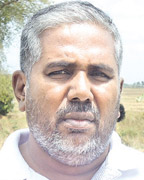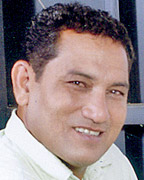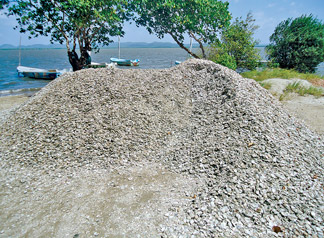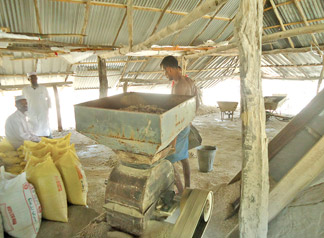Seashells - resource depleting but industry continues unabated
By Mohammed Naalir
The seashell processing industry in Kinniya is a major threat to the
environment and affects biodiversity as well. The continuous collection
of seashells has depleted the natural environment in the area. If this
process continues the region will depend on imports for the calcium
requirement of the country. Mangroves founds in the coastal belt also
face destruction.
 |
 |
 |
| A.G.M. Najaath |
M.H.M. Najath |
S.L.M. Jawadullah |
No action has been taken by the authorities to minimise the damage
caused to the environment and biodiversity as well. Destruction of one
acre of mangrove forest will lead to the destruction of nearly 100
varieties of fish. The concept of sustainable development has been
violated. If this process continues the region will face severe
environmental hazards and despite environmental degradation, Seashell
collection is continuing unabated.
The Kinniya Divisional Secretariat Division which is situated along
the Eastern coastal belt in the Trincomalee district has plenty of
natural resources. If people use these resources, the region will turn
into a hub of prosperity. The fishery industry, salt production and
seashell processing industry are the main livelihood modes of nearly 30
percent of the people in the region.
We talked to a cross section of people with regard to the seashell
processing industry. Kinniya Pradeshiya Sabha Chairman, S.L.M.
Jawadullah said a plan will be implemented to regulate the industry.
Individually seashell processing plants should be brought together
generating employment opportunities.
He said that the Pradeshiya Sabha has the authority to issue permits
and it will be valid for two months and if they misuse it will be
cancelled. He said that a large number of people who live below the
poverty line were engaged in collecting seashells and earn enough money
by selling them to seashell processing plants.
He also urged plant operators to take steps to minimise damage to the
environment by the emission of smoke and dust from the plants.
|

Dried seashells to be used for processing. Pic -:Mohammed Naalir |
Jawadullah said that if plant operators collaborated a large number
of problems can be solved. Environment pollution can also be minimised.
M.H.M. Najath, Principal of Al Siraj Muslim Maha Vidyalaya in
Thambalagamuwa, an environmental activist said that a large number of
people were engaged in this industry but have failed to pay attention to
the environment and biodiversity.
He said that the industry should be sustained as it is the livelihood
of a large number of people in the region and should function in an
environment-friendly manner.
The relevant authorities should come forward to train people in the
seashell processing plants. He said that a person who sells seashells
earns nearly Rs. 1,500 a day. If the industry is regulated it will be a
boon to economy in the region, Najath said.
He said that due to the smoke and dust emitted from the seashell
processing plants a large patch of mangrove trees have turned brown. The
mangrove trees provide shelter to certain kinds of fish and support them
to breed. He said poultry feed is produced from seashells. The plants in
Kinniya cater to the demand for poultry feeds in the region.
He said sustainable development was neglected due to lack of
knowledge. Awareness campaigns are crucial to make seashell processing
plant operators aware of the damages caused to the environment and
biodiversity by the smoke emitted from the plants. "Earlier, the Lagoon
close to Kakkamunai and Naduttivu was famous for diving for pearls and
was known as "pearl reach", he said. He said that nearly 20 percent of
people in the region depend on the fishery industry. The people who fish
in the lagoon have also been affected after the emergence of the
seashell processing industry.
|

A worker at the grinding machine |
Besides, Najath said when he was the principal of Dharul Uloom
Vidyalaya in Kakkamunai, Kinniya, to mark World Environment Day, he
organised a protest against seashell processing plants which operated in
the vicinity of the residential area.
Aliyar Thambi Nasurdeen said that he worked in the seashell
processing plant for the past three years. The plant has the capacity of
processing 300 bags of seashells per day, each bag consisting of 50
kilos. A worker who operates the machine is paid Rs. 40 for each bag. He
works for 25 days a month.
M Imamdeen said that the seashell processing industry function in
these areas for nearly 15 to 16 years as a domestic industry. Earlier,
the industry was not profitable. Now this industry has turned into a
profitable venture. Earlier people went in canoes with great difficulty
to collect seashells in the lagoon. But with the development of the
industry the people go in motor boats to collect seashells.
There are 15 plants in Kakkamunai and nearly 40 people work and 10
plants function in Naduttivu.
He said that the Pradeshiya Sabha charge Rs. 2,500 to issue permits
to seashell processing plants and transport processed material for
marketing. He said that a large number of poor people in the region
benefit from this industry. Products are sent to Kurunegala,
Kuliyapitiya, Ketipola, Kandy and Colombo for poultry feeds.
B.K. Kaleel said that in the initial stage he used seashells to
produce lime, as the product couldn't reach the market, he shifted to
producing poultry feed. The Kinniya Bridge plays a pivotal role in
improving the economy of the region. The transportation of raw material
and other products takes place smoothly. The seashell processing
industry has attracted a large number of people as it is easy to start
and was a viable business, Kaleel said.
A.G.M. Najaath, a businessman in the area said that he started
seashell processing industry in 1996 with the help of a friend who
migrated from Hambantota. In the early days only a few people were
involved in this industry, now it is a common industry in the region. |


